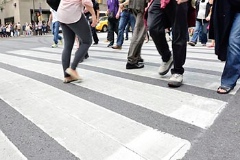 BIRMINGHAM, Ala. – University of Alabama at Birmingham (UAB) researchers have published a study showing that sleep-deprived adolescents are in greater danger crossing the street than their better-rested peers.
BIRMINGHAM, Ala. – University of Alabama at Birmingham (UAB) researchers have published a study showing that sleep-deprived adolescents are in greater danger crossing the street than their better-rested peers.
The study, published Sept. 3, in the Journal of Adolescent Health, revealed that when restricted to four hours of sleep the previous night – half the number of hours experts consider adequate for 14- and 15-year-olds – subjects in a virtual-pedestrian environment took more time to initiate crossings, crossed with less time before contact with vehicles and experienced more close calls than those who slept for 8.5 hours.
“This study suggests that adolescents’ ability to cross the street can be compromised after only one night of acute sleep restriction,” said study author Aaron Davis, Ph.D., psychology post-doctoral fellow in the Leadership Education in Adolescent Health (LEAH) program in the UAB Division of General Pediatrics and Adolescent Medicine.
Davis studied 55 adolescents in a virtual reality environment at the UAB Youth Safety Lab in the Department of Psychology, where she completed her doctoral work. Teens’ sleep was measured for two weeks by actigraphy. Participants wore an actigraph watch, and their reactions to simulated traffic situations were recorded after sleeping four hours and 8.5 hours.
Safe pedestrian behavior depends on cognitive skills, including attention and risk-taking, which can be diminished by lack of sleep. In the UAB lab, sleep-restricted adolescents showed a 50 percent increase in hits or close calls with virtual vehicles when they crossed the street tired.
“It is easy to discount the idea that this loss of sleep could have a significant impact if it occurs rarely, but this study demonstrates that adolescents’ safety could be put at risk after just one night of inadequate sleep,” Davis said.
Every year, 8,000 adolescents in the United States ages 14 and 15 require medical attention due to pedestrian injury. While sleep restricted, adolescents experienced a hit or close call on 2.2 of the 25 simulated street crossings, compared to 1.42 hits or close calls after an adequate night of sleep.
Her results could confirm the benefit of addressing sleep issues preventively during wellness counseling, she said.
“Aaron’s work demonstrates the importance of sleep for human functioning,” said David Schwebel, Ph.D., co-author and director of the UAB Youth Safety Lab. “Our results show clearly that insufficient sleep influences adolescent safety; without sufficient sleep, they are inattentive, distractible and poor decision-makers.”
Co-authors include Kristin Avis, Ph.D., and Schwebel. Davis’s work is supported by grants from the National Science Foundation and The Children’s Hospital of Philadelphia.
Davis will continue studying adolescent health as a post-doctoral fellow in the UAB School of Medicine.
“My current research will assess the efficacy of a sleep intervention for adolescents that aims to increase their sleep duration and decrease their media use during the night,” she said. “Then we will examine if the addition of this sleep intervention to a weight-management program increases adolescents’ weight loss.”

